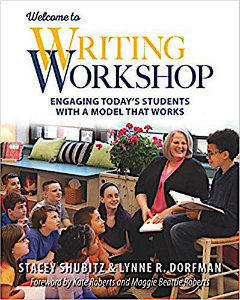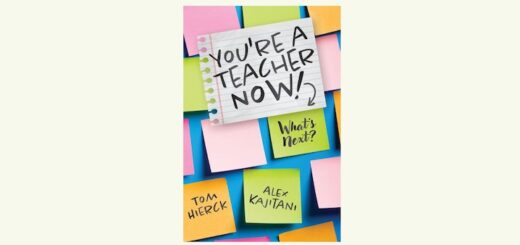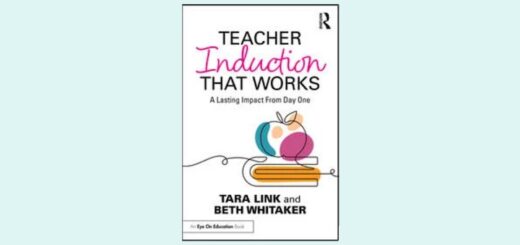Why Teachers Need to Write with Students
Stacey Shubitz is co-author (with Lynne Dorfman) of Welcome to Writing Workshop (K-6). When we asked them to share some of their ideas, they both volunteered to do a post for us. Lynne wrote about blending SEL practices into writing workshop. Stacey is here to urge you to become “writerly.”
By Stacey Shubitz
 Being a teacher who writes is the secret to being a successful teacher of writers!
Being a teacher who writes is the secret to being a successful teacher of writers!
Classroom writing communities thrive when there is trust among the students, clearly-established expectations, and shared values about the way students communicate with each other about their written work.
The classroom teacher is at the heart of a thriving classroom writing community since s/he is also a writer.
Why Must Teachers Be Writers Too?
Teacher Tim Gillespie has several compelling arguments for teachers being writers:
✻ When teachers write, we provide a positive model for our students. Our example says we value writing and find it useful, more so than when we sit and correct papers while the students write.
✻ When teachers write, we give ourselves a chance to test our own writing assignments. …
✻ When teachers write, we help demystify the act of writing. Students often think that experienced writers find writing easy or have some magic ability to “get it right the first time.” If we share our projects or write in front of our students, they can see what a sloppy, difficult act writing is for all writers.
✻ When teachers write, we learn empathy for our students. Writing can be a struggle, and this fact is easy to forget if we don’t wrestle regularly with it ourselves. …
✻ When teachers write, we become partners in a community of writers, full participants in our classroom writing workshop.
Become an Active Writing Participant
Despite the many arguments for being a teacher who writes, many teachers shy away from writing. Some haven’t had courses on teaching writers in their teacher preparation program. Others feel as though they’ve never been good at writing so they worry about doing more harm than good. Some educators have been told – by not-so-well-meaning teachers during their own schooling career – that they weren’t good writers. Others feel the burden of the demands of teaching and can’t seem to find the time to write regularly.
Whatever the reason is that you’ve shied away from writing, I’m here to tell you that being a teacher who writes is crucial to teaching writing well. After all, you wouldn’t send your child into a pool with a swim instructor who didn’t have excellent swimming skills, right? The same goes for writing. You want to be a confident writer so you can safely move your students forward as writers.
A teacher can fully participate in the classroom writing community in several ways:
- Model with your own writing during minilessons
- Share writing from your writer’s notebook
- Publish writing alongside your students at the end of each unit of study
- Share writing (e.g., articles from newsletters, blog posts) you’ve done outside of the classroom
Cultivate a Writing Habit
So how should you get started if you want to cultivate a writing habit? First, pick a time of day when you’ll write regularly. Stick with it. If necessary, schedule that time in your phone or planner as if it were a medical appointment. For more tips, see my post Creating a Consistent & Meaningful Writing Life. Here’s one thought that helps me keep writing: “Instead of judging my writing when it’s less than my best, I think about how I can revisit a given piece of writing to improve upon it in the future.”
You may start by keeping a notebook that includes short entries, lists, poetry, observations…whatever strikes your fancy! You could even join an online writing group, such as Slice of Life Tuesdays (#sol19) hosted on the Two Writing Teachers blog which will connect you with an instant audience of other teacher-writers.
No matter how you move forward, do not judge yourself – just write. Don’t worry if your writing doesn’t flow perfectly during the first few weeks. This happens to all writers at different points in their lives. What matters is that you are writing regularly.
Your students will have greater respect for you if you are a teacher of writers who writes. With every attempt you make, and subsequently share with them, their respect and admiration will increase.
A Successful Writing Community Takes Time
While building a writing community begins during the first writing workshop, sustaining a classroom writing community is a yearlong effort. To firmly establish a community of writers, students will need ample time daily for uninterrupted writing, time to talk about their writing processes, time for writerly conversations, time for conferring and collaboration, and time for reflection.
As Lynne Dorfman and I state towards the end of the chapter from Welcome to Writing Workshop, “A Community of Writers”:
Sometimes, it may feel like we should plunge right in and not spend the time to get to know our students as writers, including their attitude toward writing, their successes, and their fears. Later on, we may realize that this was a mistake.
Building a community of writers in the beginning of the year will actually save time. We may spend time on finding the right writing partner or learning how to develop ways to contribute positively to writerly conversations. In writing workshop, we want to grow writers who are independent and willing to take risks, and who genuinely look forward to their time to write.
As a teacher of writers who writes, you will grow these kinds of writers through a classroom culture that is inclusive, collaborative, joyful, and always moving writers toward greater independence (2019, 54).
Teachers are the lead writers in a writing workshop classroom. By taking on the role of lead writer, you will be inviting students on the same journey of living a writerly life rather than directlng their writing by mandate. An open invitation to join in and make writing an essential part of your life is what makes the difference when creating a community of writers.
References
Gillespie, Tim. “Becoming Your Own Expert—Teachers as Writers” The Quarterly. Vo. 8, No. 1. November 1985.
__________________________________________






































Hi Stacey,
I like all of your suggestions here, but especially the one about publishing a piece along with students at the end of a unit. I always remind myself that if I am to teach reading, I need to be a reader; the same goes for writing.
Great post !! Just read your piece on why teachers need to write alongside their students, and wow, did it resonate with me! Your analogy of not sending a child into a pool with a swim instructor who can’t swim hit home. It’s a no-brainer when put like that, yet the apprehension about diving into writing alongside students is something I’ve felt. Your suggestions for integrating writing into our teaching practice—like sharing our work and writing during minilessons are not only practical but inspiring. It’s refreshing to see the emphasis on creating a community of writers, rather than just teaching writing as a subject. This approach feels much more holistic and genuine.